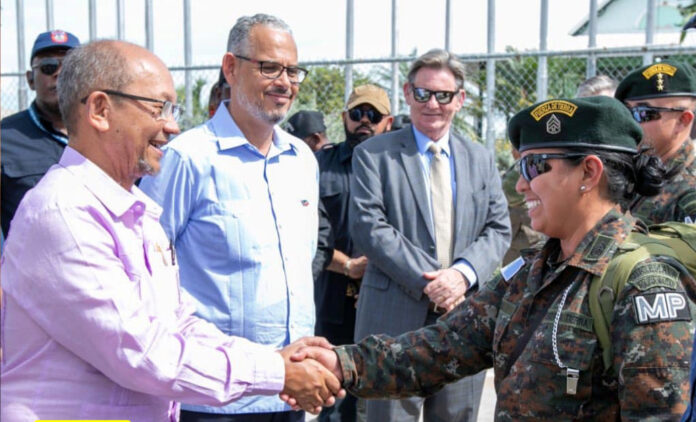
(Read Part 1) (Français)
The “Patripoche” bourgeoisie – represented by the new Lavalas/Inite government alliance – may have finally won its battle against its PHTK rival to take control of the Haitian State and “political transition.”
Assuming Alix Didier Fils-Aimé stays on as Prime Minister, this new alliance will retain control of the interim government until – if their plan succeeds – a new elected government is sworn in on Feb. 7, 2026.
Indeed, with this new alliance built around Fils-Aimé and Transitional Presidential Council (TPC) president Leslie Voltaire, Fanmi Lavalas (FL) is shoulder to shoulder with the oligarchs and the enlightened bourgeoisie long associated with the late President René Préval’s Inite, Verité, and Lespwa parties.
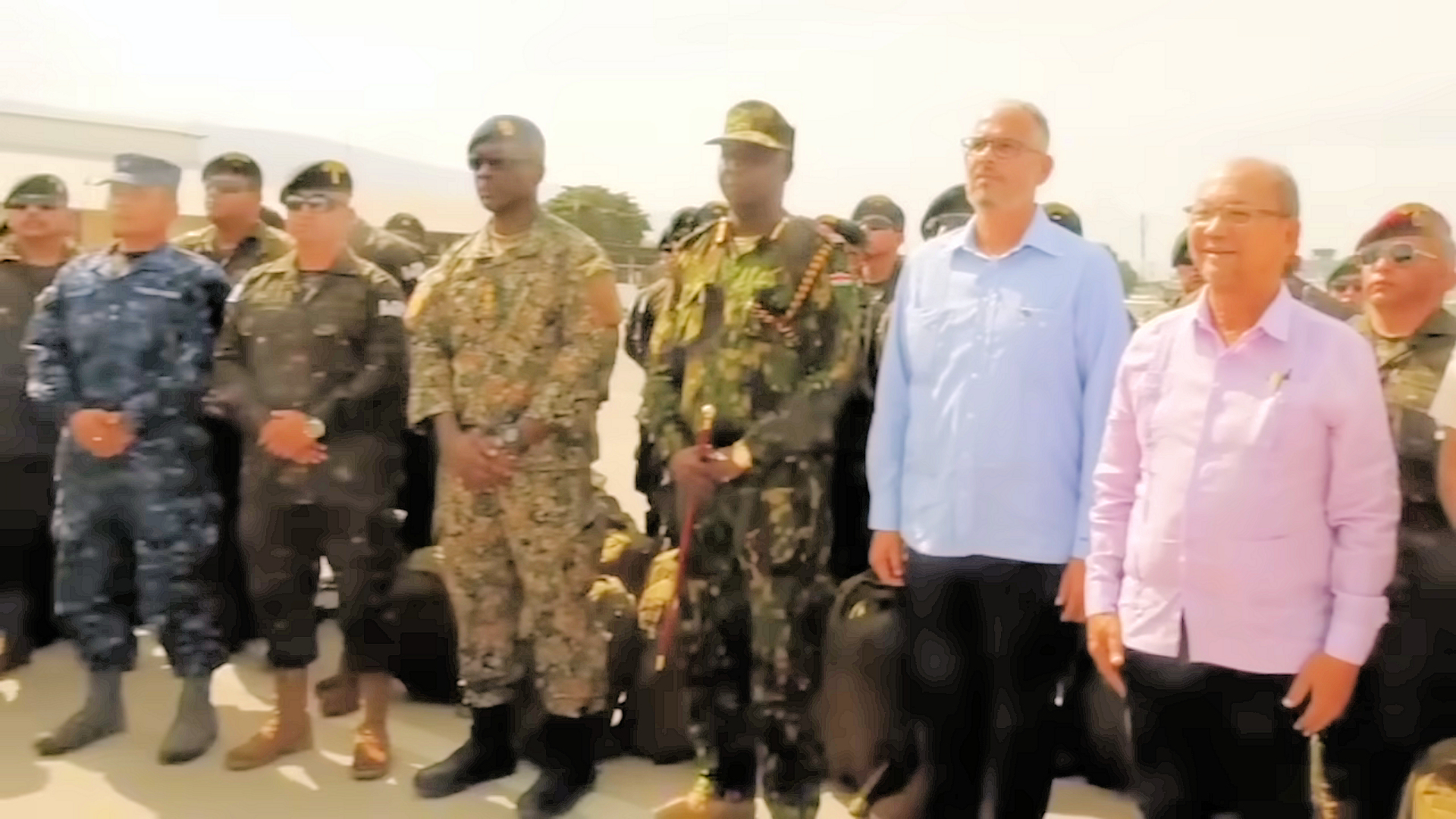
In contrast to the TPC’s political appointees who are either accused of corruption or have lost all or some support of the political sector that nominated them, FL’s Voltaire and Laurent St-Cyr, who represents the “business sector” (i.e. oligarchs), remain on more or less good terms – at least publicly – with their sponsors.
They represent the TPC’s neoliberal “left flank”, in alliance with the Montana Accord coalition.
Montana’s split with Fritz Jean
The Montana’s leaders in the BSA (Agreement Monitoring Office) – Magali Comeau Denis and Jacques Ted Saint-Dic – have been critical of the TPC, particularly since they broke off communication with Fritz Jean, accusing him of embezzling “intelligence funds for personal gain.”
In a statement made public on Dec. 4, 2024, the BSA criticized Fils-Aimé’s cabinet choices, saying they are “tainted by the same illegitimacy, the same opacity, the same flaws and the same conflicts of particular interest, in opposition to the national interest.”
In a separate interview with Alterpresse, Saint-Dic said in responding to a question about the selection of Fils-Aimé as PM, “it is dangerous to entrust the hegemony of political power to the private sector,” clearly expressing concern that a sector of Haiti’s oligarchs now control the TPC.
Montana’s leadership perhaps does not like that they’ve been cut out of the TPC. In the past, Saint-Dic has expressed enthusiasm for building a “national bourgeoisie” with the business sector. In September 2022, he explained that his mission was “to lay the foundations for the reconstruction of a national bourgeoisie.” This was to be achieved by pushing for “a global consensus within the private sector” in Haiti.
While this new alliance between FL, Inite /Lespwa, and the business sector may represent a nascent attempt to construct a national bourgeoisie as Saint-Dic had envisioned, for the moment Montana’s BSA leadership seems not to be part of the process.
The Patripoche bourgeoisie’s support for a “marriage” between the PNH and civilians
Meanwhile, Fritz Alphonse Jean, Montana’s rogue TPC representative, declared on Dec. 6, 2024 in a press release his intention, when he assumes the presidency in March, to draft a “war budget,” which will be implemented to strengthen the Haitian National Police (PNH). In the statement, Jean also praised the “courage of the police officers, [Multinational Security Support mission] MSS soldiers, and the population who contributed to a successful operation in Petite Rivière de l’Artibonite with the aim of freeing the region from criminal gangs.”
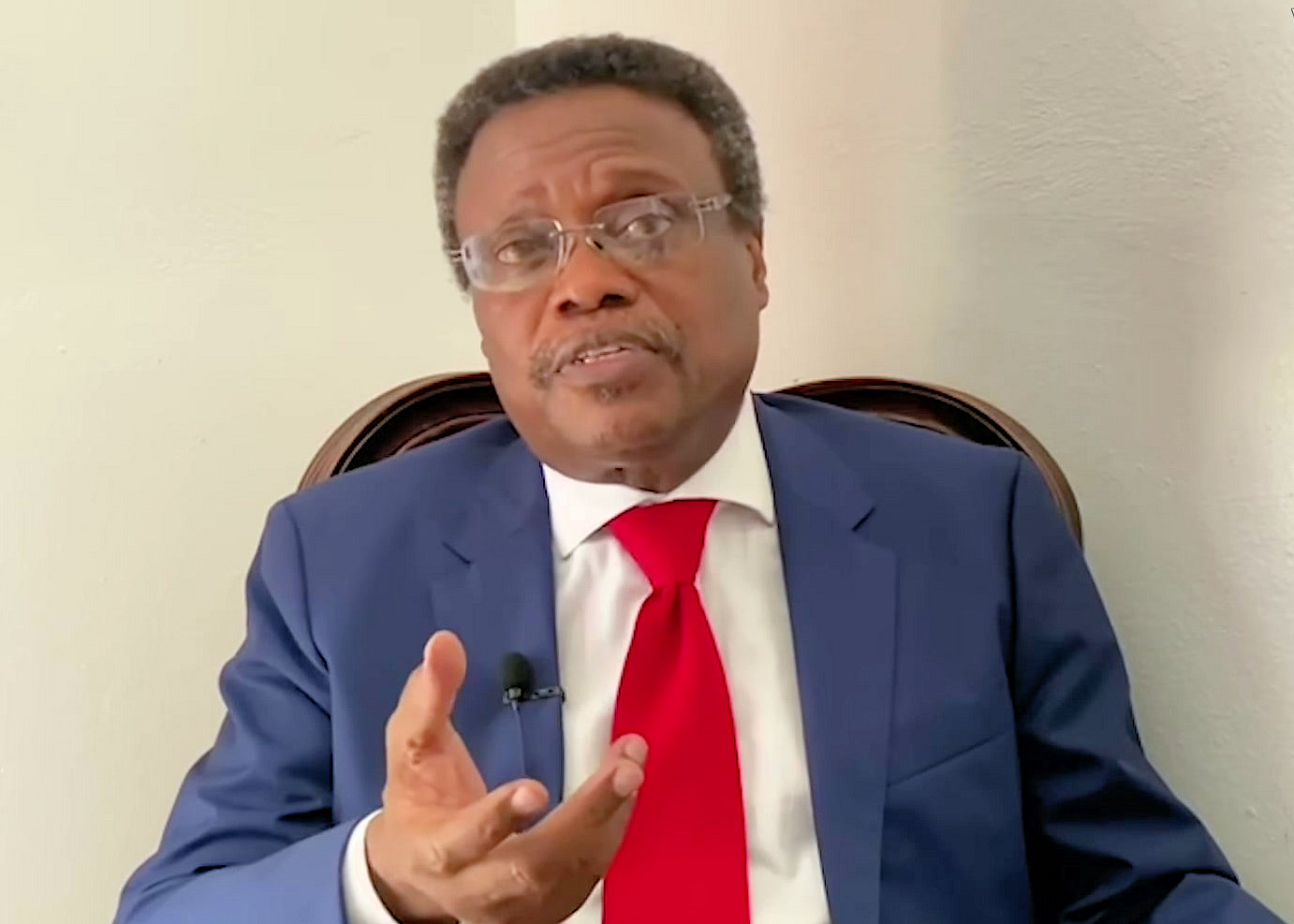
This follows a statement Jean made two weeks earlier. He “encouraged the population to actively collaborate with the police, stressing that this partnership is essential to bring peace.” He proposes “a concerted mobilization between the police and the population” and “highlighted the importance of effective collaboration to restore security.”
Jean’s enthusiasm for a “collaboration” between the PNH and civilians is shared by other actors serving the Patripoche bourgeoisie. This includes the National Human Rights Defense Network (RNDDH) director Pierre Espérance.
Espérance encouraged the PNH to arm civilians as part of the offensive against the Viv Ansanm coalition of armed groups. He also encouraged civilians to “set up vigilance brigades to protect their neighborhoods against the violence of armed gangs.”
This is a complete reversal of the RNDDH’s previous position on vigilantism. In May 9, 2023, the RNDDH published a report that stated unequivocally that the original spontaneous, autonomous, grassroots Bwa Kale movement “cannot overcome” the gangs and that “state authorities must immediately take the necessary measures to put an end to all forms of violence,” including “immediate measures to put an end to the ongoing spiral of violence” in Haiti.
The RNDDH’s reversal is an indicator of the significant differences between the original and now resurrected versions of Bwa Kale.
The Bwa Kale movement that began on Apr. 24, 2023 in Port-au-Prince saw local neighborhood defense groups – or vigilance brigades – formed organically by communities to attack local criminal gangs. It was not uncommon to see local PNH officers join large crowds armed mostly with machetes.
The current iteration of Bwa Kale is significantly different. Romain Le Cour, a senior expert at the Switzerland-based Global Initiative Against Transnational Organized Crime, describes it as “a marriage between the police and the people.”
Now, in most instances, the PNH or oligarchs have been actively funding, arming, and equipping the vigilantes.
Le Cour told the Miami Herald that “it is alarming that, in recent months, the government and police have extolled the merits of what they describe as… a marriage between the police and the people and have called on the citizenry to support law enforcement.”
Support for the MSS was a precondition for membership in the Washington-concocted TPC.
“It is a chillingly dangerous dynamic,” he continued, “considering that many of today’s gangs started out as vigilante groups, and one that sends the message that the state and its police are not able to provide public security.”
Meanwhile, the FL’s view has evolved substantially over the past year on what kind of armed interventions are necessary for combating insecurity.
In June, Voltaire commented that “I don’t think the gangs in the end will be able to confront the combination of the Kenyans and the Haitian National Police, which we are fortifying now and which will guide the multinational forces. I think the job will be done very well.”
At the same press conference, Voltaire emphasized that “international development institutions like World Bank, Inter-American Development Bank [IDB], USAID, and the EU need to do more thorough follow-up than they have in the past after peacekeeping missions to make the streets safe again.”
Voltaire’s statement was in line with Pentagon thinking. In 2019, Wikileaks leaked a U.S. Army manual on “unconventional warfare.” In an article for Mintpress News, Whitney Webb analyzed the manual which said that global financial institutions like the World Bank and IMF can be used as unconventional, financial “weapons in times of conflict” as well as in leveraging “the policies and cooperation of state governments.” Meanwhile, USAID is widely regarded as a CIA front/partner.
Support for the MSS was a precondition for membership on the Washington-concocted TPC. As Dr. Jemima Pierre pointed out, “Haitians chosen to be part of the negotiations on a new Haitian government had to agree to U.S. terms for a foreign intervention before being allowed to participate,” making the FL complicit in a foreign armed intervention’s deployment.
By October, Voltaire had lost the confidence he voiced in June for the MSS and international financial institution (IFI)-backed “unconventional warfare.” In a letter to the UN Secretary General, Voltaire requested “that the MSS be transformed into a peacekeeping mission as soon as possible.”
This is a reversal from the FL’s previous position on an armed foreign intervention. In a presentation that FL leaders “Pasha” Vorbe and Maryse Narcisse made in April 2024, they stated that the “effective and lasting solution that we must find to the country’s security problems is not going to come only from yet another multinational force.”
The Patripoche bourgeoisie back the “marriage” between the PNH and the population
Voltaire also supports the “marriage” between the PNH and civilians. In a speech delivered on Jan. 1, 2025, Voltaire said that “the [TPC], the Prime Minister, the cabinet, and all state entities are committed to this war against insecurity.” He explained that the Haitian “people are in a situation of legitimate self-defense,” emphasizing a police-community partnership.
This support for civilians joining PNH forces to take on armed groups is even shared by Fils-Aimé. According to a Miami Herald report, in a press briefing he asked the public to “be vigilant” and help the security forces.
The liberal bourgeoisie is increasingly enthusiastic for civilians to accept arms from and work side-by-side with the PNH.
It also applauded a report in mid-November that a civilian “brigade” in Canapé-Vert near Pétionville, armed by and working with the PNH, successfully repelled a supposed attack by suspected gang members, reportedly killing 28 men. While some reports said that those killed were Viv Ansanm soldiers, Cherizier denied the claim.
Several accounts on social media celebrated this report as a victory of the civilian/PNH marriage against the Viv Ansanm.
Left out of this narrative was that these same vigilance brigades murdered at least one child, suspected of helping Viv Ansanm forces. Two witnesses told Ayibopost that the “crowd killed the child and set fire to his body.”
The PNH’s role in escalating violence in Port au Prince
The execution and immolation of this child by armed civilians working with PNH is not an isolated incident. These kinds of public executions of suspects are becoming common.
An year-end report by the Office of the High Commissioner of Human Rights (OHCHR) “documented 315 lynchings of gang members and people allegedly associated with gangs, which on some occasions were reportedly facilitated by Haitian police officers.” The report also stated that an additional “ 281 cases of alleged summary executions involving specialized police units occurred during 2024.”
According to an earlier UN report, from July to September 2024, “law enforcement officials carried out at least 106 extrajudicial killings, with victims including six children as young as 10 years old who were accused of passing information to gang members.”
The PNH’s persistent, under-reported war against the poor masses, often civilians who live in territory controlled by armed groups, began months ago.
The same report explains that at least 122 killings were blamed on “self-defense groups” that formed last year and have targeted “suspected” gang members or people accused of crimes, including stealing animals or cell phones. “Victims were mutilated with machetes, stoned, decapitated, burned alive, or buried alive,” the report said. “Children were not spared.” Overall, at least 59 children were killed or injured in the third trimester.
With dozens of innocent children already murdered by PNH and civilian auxiliaries, it is certain that these numbers will increase if this “marriage of police and civilians” continues.
A recent UNICEF report explained that “children comprise up to 50% of armed groups in Haiti.” The report noted that recruitment is “driven by widespread poverty, lack of education, and the collapse of essential services.”
These reports underline a pattern of PNH behavior: a policy of terrorizing residents of territory controlled by armed groups.
Indeed, on Sep. 30, 2024, a UN panel of experts presented their report to the UN Security Council in which they stated that from Jan. 1 to Mar. 31, 2024: “590 civilians unrelated to gangs were killed or injured during police operations against gangs. There have been also reports of extrajudicial executions by police officers in the areas of Cité Soleil, Drouillard, and Vincent in the commune of Port-au-Prince.”
Haitian journalist Ralph Laurent reported on Jun. 29, 2024 on his show Tele Live Tanbou Verite A that:
“Before the Kenyan mercenaries arrived in the land of Jean-Jacques Dessalines this month, a bunch of foreign and local mercenaries spent more than three months murdering young women and young men in our various neighborhoods, accusing them of being ‘gang members.’ Remember, if your National ID card is marked Delmas 2, Delmas 4, Delmas 6 until at least Delmas 24, UTAG-10 [the PNH’s Anti-Gang Unit] and other mercenaries condemn you to death. After they kill you, they stuff you inside their tank. If you are a woman, they rape you before they shoot you, and they do this even if you are a man because they have gays among them too. After that, they smash your head and burn your body. When UTAG-10 eats us like this, the police already have several media lined up to say that we are criminals … and also to make us believe that Viv Ansanm murdered us.”
“For example: A UTAG-10 armored car and other invisible mercenaries shot at a public transportation bus last month in the Fontamara area. At least six passengers died on the spot. Although there were among the victims some who filmed the scene on the spot and confirmed that it was a [PNH] armored car that carried out the massacre, just like Delmas 60, 95 and 103, Radio Tele Métronome, which I always respect, declared that it was the Viv Ansanm thugs who fired on the bus and killed the passengers…”
Examples of PNH executing civilians are not hard to find on Social media.
On Dec. 16, Stephanie Douyon described in a post on X a PNH execution of a civilian. Douyon claims a truck had broken down, blocking a narrow road. A PNH officer, who was part of a motorcade involving a “VIP,” exited their car and shot the driver point blank in the head.
In the same week, Vélina Charlier described another incident on X. According to Charlier, a PNH officer executed one civilian and shot two others inside a nightclub.
Journalists Dan Cohen and Kim Ives also reported how PNH officers, recorded by a drone executed an unarmed man, robbed his corpse, and then ran over his body with their armored vehicle.
The PNH’s persistent, under-reported war against the poor masses, often civilians who live in territory controlled by armed groups, began months ago. Perhaps this shouldn’t come as a surprise because PNH officers made their policy clear months ago to French media.
Cohen points out that in May of 2024, a PNH officer explained to France24 that they operate under the assumption that there are no civilians in impoverished neighborhoods. “We don’t need to know if they’re armed or not. We just fire,” the policeman explained.
Port Sondé and the escalating violence against civilians
Recent events in Port Sondé illustrate the dangers of conflating the original 2023 Bwa Kale movement with the current vigilantism backed by Haiti’s powerful elite.
On Oct. 3, 2024, the Artibonite Valley’s Gran Grif armed group attacked Pont Sondé, killing approximately 70 people. Initial reports framed the attacks as Gran Griff, led by Luckson Evans, simply terrorizing Pont Sondé residents.
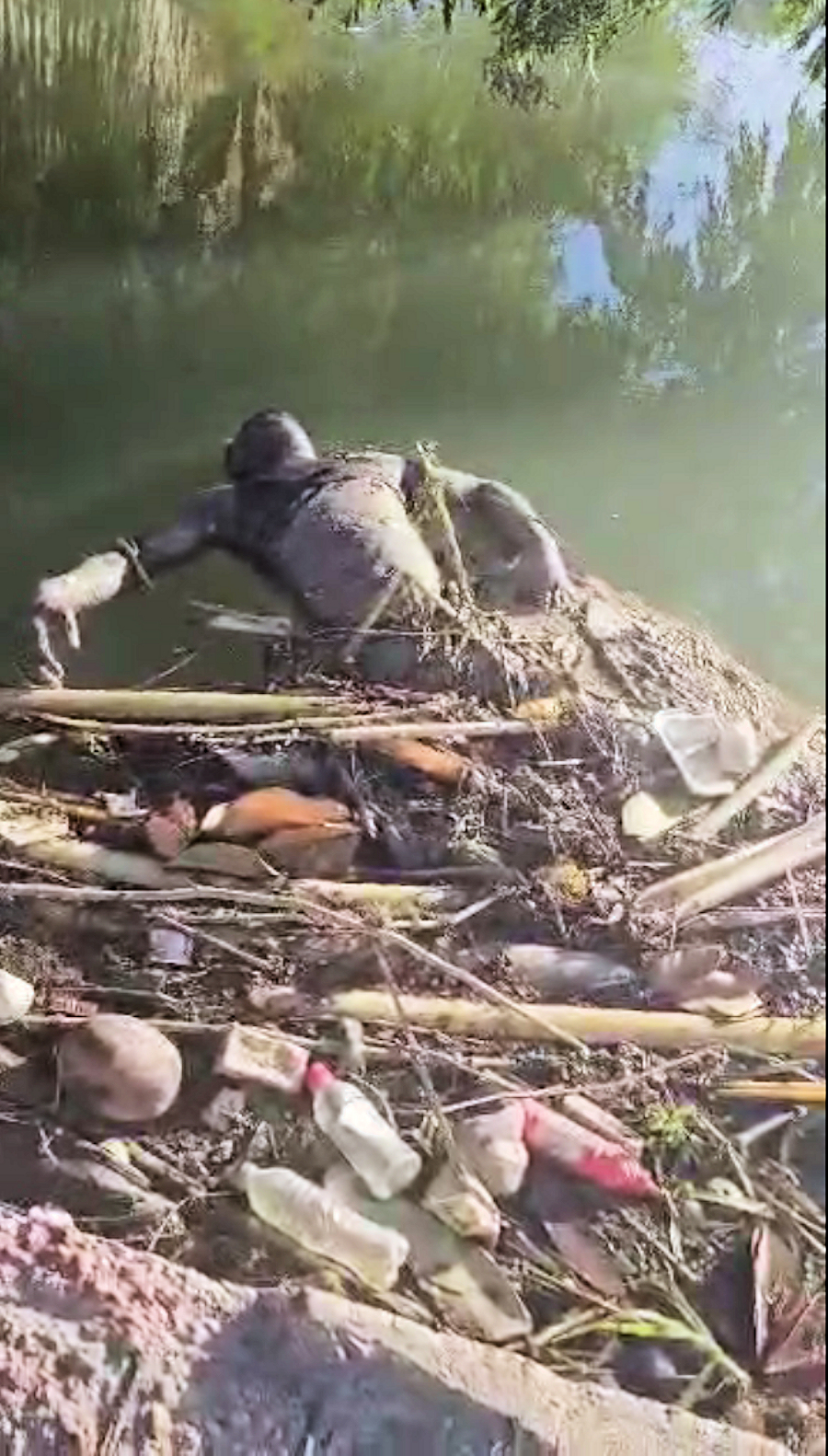
These reports left out crucial details that were later revealed in an investigation by Henriot Dorcent and Kim Ives of Haiti Liberté.
Their investigation revealed that this massacre is part of an ongoing battle between two armed groups: Gran Grif (Big Claws) and Kowalisyon (The Coalition).
Haiti Liberté describes Gran Grif as “loosely affiliated” with Viv Ansanm. Both Gran Grif and Kowalisyon were founded by local oligarch Prophane Victor. “Some years ago”, the article explains, “Prophane lost control of Gran Grif and then helped form, fund, and arm Kowalisyon to fight and destroy it.”
Victor was sanctioned by the UN, as well as the Canadian and U.S. governments. On Jan. 13, Haitian police arrested him in Port-au-Prince.
Luckson claims that, in the months leading up to the Oct. 3 attack on Port Sondé, the “Kowalisyon, with PNH help, has seized, beaten, tortured, killed, or disappeared many people – including women and children – who were from Gran Grif ‘s stronghold in Savien when they passed through Pont Sondé on their way south.”
Luckson pleaded with Kowalisyon during a live TikTok conversation with Viv Ansanm spokesperson Jimmy Chérizier to make peace and stop targeting his people and diverting traffic in Pont Sondé.
“We don’t want to fight with you,” Luckson said. “Let us learn to live together.”
Kowalisyon leaders however, were unmoved.
Following Gran Grif’s attack on Port Sondé, residents expressed their outrage at the violence on several fronts.
First, many residents told Le Nouvelliste that they believed the media was deliberately inflating the number of civilians murdered. Initial reports said over 100 civilians were murdered. Later, the number was lowered to 70. Le Nouvelliste’s investigation could only find evidence for approximately 40 victims.
Horace Derléus, president of the Funeral Services Association of Lower Artibonite (AEFBA), told Le Nouvelliste that “the inflation of the numbers is a clear attempt to attract humanitarian aid and benefit as much as possible from potential state financial compensation.”
The TPC’s signatory groups are deeply divided with the Lavalas, Montana, and the business sector on one side and the Jan. 30 Collective, the Dec. 21 Coalition, and the EDE/RED on the other.
Approximately a month after the attacks, Le Nouvelliste reported that the October 3rd Collective, which is “composed of several civic organizations from the Pont Sondé community,” organized a demonstration of “over a thousand protesters” who demanded “the radical dismantling of the two main armed groups in the department.” Protestors were referring to Gran Grif and a criminal armed group named Kokorat san ras, based in nearby Lacroix-Périsse.
They also complained about the local PNH. An October 3rd Collectives spokesperson said “the agents of the Haitian National Police and the Multinational Security Support Mission have done nothing concrete to counter the criminals.” He explained that “every evening, new bottles of rum and crates of beer arrive at the Pat Chwal police station, where the national and international forces are based.”
Demonstrators also accused “the head of the interim executive commission, Myriam Fièvre, and the vice-delegate of the Saint-Marc district, Walter Montas” of “corruption” and “mismanagement.”
One month later, on Dec. 3, the Commission for Dialogue, Reconciliation, and Awareness to Save Artibonite and the Federation of Peasant Organizations and Agricultural Entrepreneurs of the Artibonite Valley organized another demonstration in Port Sondé. They expressed their frustration over government and PNH inaction.
According to Le Nouvelliste, Bertide Horace, a radio show host and spokesperson for the organizations present, told demonstrators about the “importance of solidarity between the population and the police: “Horace was echoing Voltaire’s view that ‘the population must support the police and multinational forces, as they are doing in the Artibonite department.’” Both seemingly contradicting the view of other residents that the PNH and MSS are inept.
After Horace’s remarks, MSS Commander Philippe Chimoatiya, addressed the demonstrators, telling them: “Do not worry; we will soon launch an attack on Savien,” where Gran Grif is based.
A few days later, according to a Miami Herald report, Gran Grif counter-attacked, leading to a spiral of violence that would result in a total of 150 residents murdered.
The article explained that, once Gran Grif soldiers fled Pont Sondé upon the arrival of the PNH and MSS, “a so-called citizens’ defense group” was formed to carry out “its own attacks with machetes and knives on suspected gang members and sympathizers.”
It is unclear whether Prophane Victor’s Kowalisyon is connected to this citizens self-defense group Horace described.
Horace shared graphic images and videos of the carnage with Miami Herald staff: torched houses, streets and a river strewn with discarded bodies, many of them missing arms and legs.
Horace explained that most of the killings were carried out by members of the citizens’ defense group, which took advantage of the PNH presence. “Between Sunday and Tuesday”, she said, “residents were dragged from their homes and off the streets and hacked to death with machetes and knives.”
Horace told the Herald that “no consideration was given by the vigilante group to people’s innocence or whether the victims had been coerced by the gangs.”
The Herald report goes on to explain that: “Among those killed: a longtime spaghetti vendor who sold meals in the community and a popular soccer player who, after being questioned by police, was then set on fire by members of the vigilante group.”
“His family has said he had nothing to do with the gangs,” Horace told the Herald. “There are people who had criminal ties to gangs, but there are also people who were victims of personal vendettas.”
The civilians executed by these vigilance brigades include a local beautician who was murdered for allegedly providing manicures and pedicures to armed group members. The beautician, an openly gay man, was executed along with two other civilians.
Dialogue with armed groups?
Indeed, the benefits of this “marriage” between the PNH and civilians for the general public is debatable. Aside from provoking retaliations from armed groups and causing the murder of more innocent children, executions by the PNH collaborating with vigilance brigades led to the closing of a Médécins sans Frontières (MSF) hospital.
A Nov. 13, 2024 MSF press release stated that on Nov. 11, “an MSF ambulance transporting three young people with gunshot wounds was stopped by Haitian police about 100 metres from the MSF hospital in the Drouillard area of Port-au-Prince.”
“After an attempt to arrest the patients and firing shots in the air, the police escorted the ambulance to Hôpital La Paix [on Delmas 33]. Once there, law enforcement officers and members of a self-defense group surrounded the ambulance, slashed the tires, and tear-gassed MSF staff inside the vehicle to force them out. They then took the wounded patients a short distance away, outside the hospital grounds, where at least two of them were executed.”
Consequently, the MSF hospital was closed for 22 days and has only recently “partially resumed medical activities.”
Groups begin to call for the removal or change of the TPC
As this article is concluded, events are happening quickly in the final days before Donald Trump replaces Joe Biden as the U.S. President on Jan. 20, 2025.
On Jan. 3 and 4, the MSS received an infusion of 158 new police officers from Guatemala and El Salvador, bringing its total strength to 572, just over 20% of the 2,500 planned for.
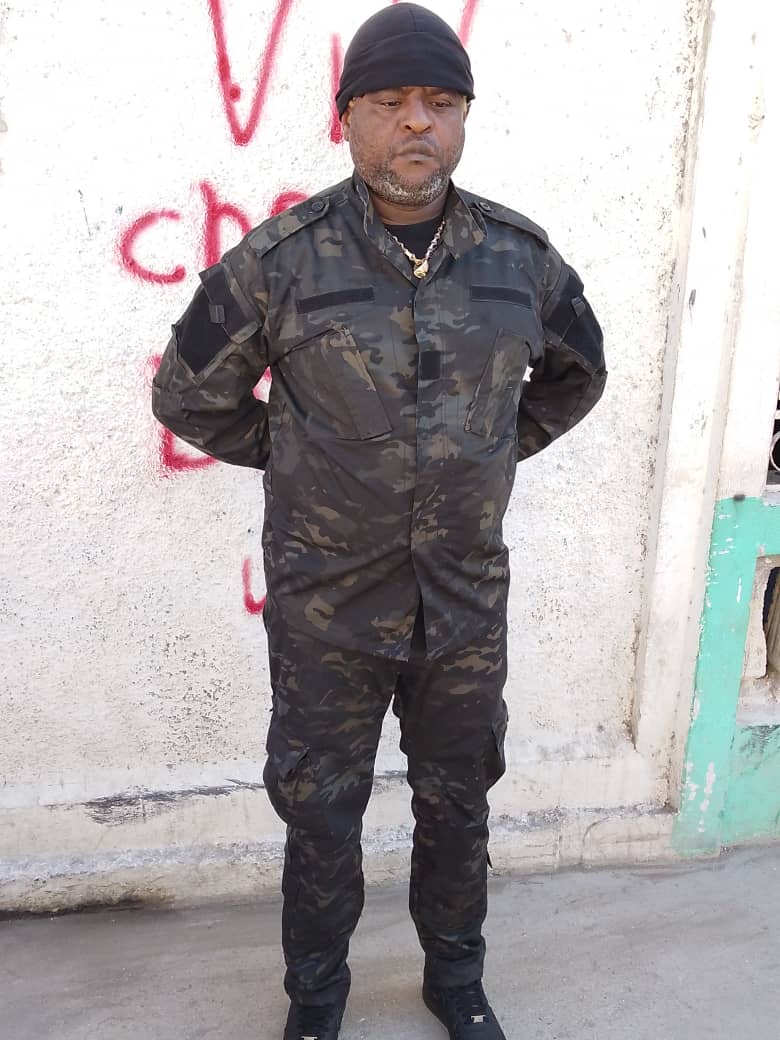
On Jan. 1, Haiti’s independence day, the Viv Ansanm’s spokesman Jimmy “Barbecue” Cherizier held a press conference to call for the TPC’s dissolution and replacement by a government formed from Haiti’s nine Supreme Court justices, as the 1987 Haitian Constitution prescribes. “Viv Ansanm has now reestablished the 1987 Constitution across Haiti,” Cherizier said.
He also declared that the Viv Ansanm coalition had transformed itself that day into a political party, prompted in part because “the criminal Nènèl Cassy has stormed the Justice Ministry to form his political party which he calls the ‘Life Political Party.’” Cassy is a former FL Senator, a Democratic and Popular Sector (SDP) founder, and the strongman behind the new Lavalas/Inite government, providing many of its officials from his networks.
The TPC’s signatory groups are deeply divided with the Lavalas, Montana, and the business sector on one side, and the Jan. 30 Collective, the Dec. 21 Coalition, and the EDE/RED sector on the other. The latter three coalitions just sent a joint proposal on Jan. 8 to CARICOM, calling for changes to the TPC, and even integration of Supreme Court justices. But the letter has caused panic and outrage among the Lavalas/Inite sector primarily because it has proposed that the Viv Ansanm Political Party have a seat at the table where any new transitional regime would be negotiated.
According to Le Nouvelliste, “the leaders of these political party coalitions proposed three potential solutions to CARICOM regarding the crisis undermining the TPC. First, a collegial presidency comprising three members: one from the Supreme Court, one from civil society, and one from the political sector. Second, a streamlined TPC reconfigured with three new individuals. Third, a restructured TPC based on the confirmation or dismissal of the seven voting members by their respective mandates.”
The Viv Ansanm has been calling for dialogue for months, even while pressing for overthrow of Haiti’s political and economic systems. But now it has thrown two curve balls at the Patripoche bourgeoisie alliance running Haiti.
First, it is calling for the Supreme Court to take power. Second, it is forming a political party seemingly poised to enter the political class’ muddy arena.
These two demands raise many questions. Can the Viv Ansanm maintain its revolutionary demand to throw out the corrupt political system by entering into it? Wouldn’t the nine-member Supreme Court be just as subservient and corrupt as the current TPC? Are the PHTK allied and adjacent groups that are now challenging the power of the Lavalas/Inite alliance, which Cherizier also rails against, not just as corrupt and submissive to foreign dictates?
In its Jan. 1 edition, Haiti Liberté’s lead story was entitled “The Solution is to Dissolve the TPC.”
“The corrupt political class blindly relies only on the United States because, according to it, that is the only way to reach the top to lead this country,” wrote Isabelle Papillon. “This slavishness is unpatriotic and treacherous, and the people must condemn it rigorously because under the leadership of Washington, Haiti has become a nation of lackeys. The only possible solution is the dissolution of this presidential structure and also of the system that surrounds it and guides it one-way in the wrong direction.”
The coming weeks will tell if the TPC can survive the incipient power struggles.
Before becoming interim TPC president, Voltaire’s suggested that a Truth and Justice Committee be established to “facilitate gang members disarming, appearing before victims, and repenting,” but today he has changed his tune to conform with the hardline of the U.S. and France.
For the moment, the path forward is in the hands of the Lavalas/Inite alliance and Patripoche bourgeoisie. Will they pursue dialogue with Viv Ansanm to facilitate a cease-fire, or will they continue to encourage summary executions by the PNH and their auxiliaries, invite ever more foreign troops into Haiti, and kowtow to Washington’s dictates?
Unfortunately, the Lavalas’ historical trajectory seems to be to the right.
Travis Ross is a teacher based in Montreal, Québec. He is also the co-editor of the Canada-Haiti Information Project at canada-haiti.ca. Travis has written for Haiti Liberté, Black Agenda Report, The Canada Files, TruthOut, and rabble.ca. He can be reached on X.










[…] Source link […]
[…] PNH’s persistent, under-reported war against the poor masses has led to a mounting number of civilian deaths, including […]
[…] used to meet in his office. For the moment, the Montana Accord’s CPT representative, Fritz Jean, is running the dysfunctional interim […]